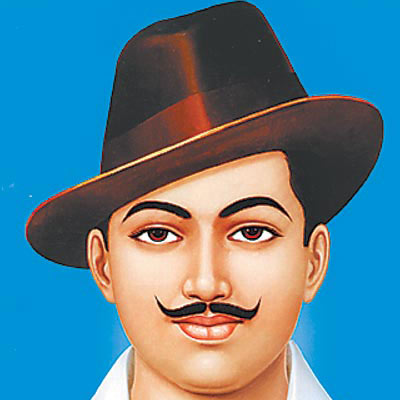Bhagat Singh was an Indian revolutionary socialist who was influential in the Indian independence movement. Born into a Jat Sikh family which had earlier been involved in revolutionary activities against the British Raj, he studied European revolutionary movements as a teenager and was attracted to anarchist and Marxist ideologies. He worked with several revolutionary organisations and became prominent in the Hindustan Republican Association (HRA), which changed its name to the Hindustan Socialist Republican Association (HSRA) in 1928.
Seeking revenge for the death of Lala Lajpat Rai, Singh assassinated John Saunders, a British police officer. He eluded efforts by the police to capture him. Soon after, he and Batukeshwar Dutt threw two bombs and leaflets inside the Central Legislative Assembly, and offered themselves for arrest. Held in jail on a charge of murder, he gained widespread national support when he undertook an 116-day hunger strike demanding equal rights for European prisoners, and those Indians imprisoned for what he believed were political reasons. During this period, sufficient evidence was brought against him for a conviction in the Saunders case after trial by Special Tribunal, and an appeal to the Privy Council in England. He was convicted and hanged for his participation in the assassination, at the age of 23.
His legacy prompted youth in India to continue fighting for independence and he remains an influence on some young people in modern India, as well as the inspiration for several films. He is commemorated with a range of memorials including a large bronze statue in the Parliament of India.
Bhagat Singh, a Sandhu Jat,was born in 1907[a] to Kishan Singh and Vidyavati at Chak No. 105 GB, Banga village, Jaranwala Tehsil in the Lyallpur district of the Punjab Province of British India. His birth coincided with the release of his father and two uncles, Ajit Singh and Swaran Singh, from jail.His family members were Sikhs; some had been active in Indian Independence movements, others had served in Maharaja Ranjit Singh’s army. His ancestral village was Khatkar Kalan, near the town of Banga, India in Nawanshahr district (now renamed Shaheed Bhagat Singh Nagar) of the Punjab.
His family was politically active. His grandfather, Arjun Singh followed Swami Dayananda Saraswati’s Hindu reformist movement, Arya Samaj, which had a considerable influence on Bhagat.His father and uncles were members of the Ghadar Party, led by Kartar Singh Sarabha and Har Dayal. Ajit Singh was forced into exile due to pending court cases against him while Swaran Singh died at home in Lahore in 1910 following his release from jail.
Unlike many Sikhs of his age, Singh did not attend the Khalsa High School in Lahore. His grandfather did not approve of the school officials’ loyalty to the British government.He was enrolled instead in the Dayanand Anglo-Vedic High School, an Arya Samaji institution.
(Ref:
